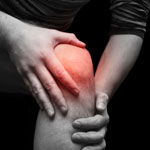 Joint pain is a huge problem in North America — and not just in older adults. Those in their 30s (and sometimes even younger!) are now increasingly inflicted with the aches and pains and stiffness associated with arthritis. Researchers point to a number of different reasons for the spike in arthritis cases, citing diet, exposure to toxins, lack of exercise, and a genetic predisposition as possible triggers. Doctors prescribe drugs to help patients deal with arthritic pain, but often these meds come with unwanted prescription side effects — so what to do?
Joint pain is a huge problem in North America — and not just in older adults. Those in their 30s (and sometimes even younger!) are now increasingly inflicted with the aches and pains and stiffness associated with arthritis. Researchers point to a number of different reasons for the spike in arthritis cases, citing diet, exposure to toxins, lack of exercise, and a genetic predisposition as possible triggers. Doctors prescribe drugs to help patients deal with arthritic pain, but often these meds come with unwanted prescription side effects — so what to do?
In recent health news, researchers in Australia have studied the effectiveness of herbal medicine interventions in the treatment of rheumatoid arthritis. They conducted a massive review of clinical trials, searching the electronic databases of MEDLINE, EMBASE, AMED, CINAHL, and the WHO International Clinical Trials Registry Platform.
A total of 22 studies were selected for closer review. The research team found evidence from seven studies indicating the potential benefits of gamma linolenic acid (GLA) from evening primrose oil, borage seed oil, or blackcurrant seed oil, in terms of reduced pain intensity and improved disability.
GLA is an omega-6 fatty acid that is considered an essential fatty acid — meaning it is necessary for your health, but your body can’t make it. You need to get GLA from food. Along with omega-3 fatty acids, omega-6 fatty acids play a crucial role in brain function, as well as normal growth and development. Also known as polyunsaturated fatty acids, they help maintain bone health, which may account for their ability to reduce the pain and stiffness associated with arthritis.
RECOMMENDED: The Truth About Omega-6 and GLA
There are several different types of omega-6 fatty acids. Most omega-6 fatty acids in the diet come from vegetable oils in the form of linoleic acid (LA). Your body converts LA to GLA and then to arachidonic acid (AA). GLA can be gotten from several plant-based oils including the three oils from the Australian study: evening primrose oil; borage oil; and blackcurrant seed oil.
Here’s one more health tip: a healthy diet contains a balance of omega-3 and omega-6 fatty acids. The typical American diet tends to contain 14 to 25 times more omega-6 fatty acids than omega-3 fatty acids. When GLA is taken as a supplement, a lot of it is converted to a substance called “DGLA” that fights inflammation. Having enough of certain nutrients in your body (such as magnesium, zinc, and vitamins C, B3 and B6) helps promote the conversion of GLA to DGLA.
